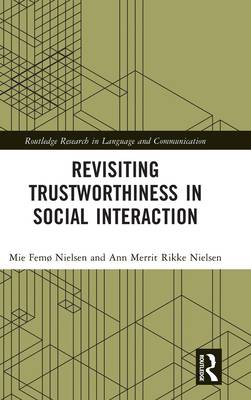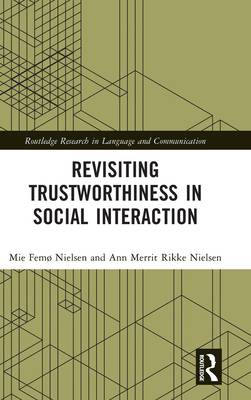
- Retrait gratuit dans votre magasin Club
- 7.000.000 titres dans notre catalogue
- Payer en toute sécurité
- Toujours un magasin près de chez vous
- Retrait gratuit dans votre magasin Club
- 7.000.0000 titres dans notre catalogue
- Payer en toute sécurité
- Toujours un magasin près de chez vous
Description
Bringing together trust research, rhetoric, ethnomethodology and conversation analysis, this book formulates an analytical program for conceptualizing and defining trustworthiness as an empirical research object in social interaction.
Revisiting Trustworthiness in Social Interaction examines trustworthiness as a relational and dynamic concept. It reviews sociological and rhetorical approaches to the study of trustworthiness and respecifies it as an interactional phenomenon displayed, tested and negotiated by participants in social interaction. It identifies four participant orientations of trustworthiness that may be foregrounded in peoples' dynamic identity projects, and it defines the phenomena 'character-bound displays' and 'sequential negotiation of character', both indicative of participants' orientation to trustworthiness. In this way, the book turns the theoretical concept of trustworthiness into an empirical object of interaction analysis, pointing to a vast number of interactional indicators, which allow interaction analysts to explore if and how interactants orient to trustworthiness in an encounter. Exemplary cases from both mundane and institutional encounters are analyzed using ethnomethodological multimodal conversation analysis showing how trustworthiness is done, challenges, achived, negotiated and lost in interaction.
The intended audiences are scholars of conversation analysis, ethnomethodology, rhetoric and the social sciences, especially communication, organizational and leadership studies, and their students.
Spécifications
Parties prenantes
- Auteur(s) :
- Editeur:
Contenu
- Nombre de pages :
- 192
- Langue:
- Anglais
- Collection :
Caractéristiques
- EAN:
- 9781032249568
- Date de parution :
- 30-09-22
- Format:
- Livre relié
- Format numérique:
- Genaaid
- Dimensions :
- 152 mm x 229 mm
- Poids :
- 444 g

Les avis
Nous publions uniquement les avis qui respectent les conditions requises. Consultez nos conditions pour les avis.






